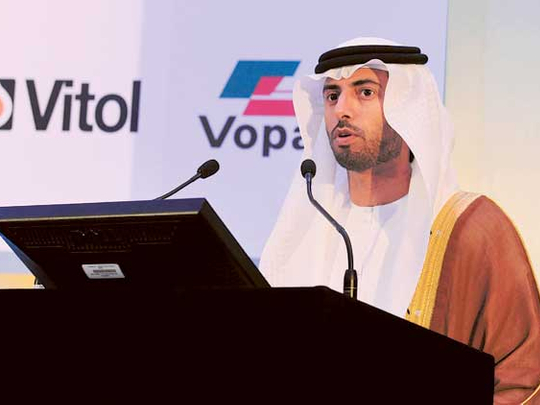
Abu Dhabi: Suhail Mohammad Al Mazroui, UAE Minister of Energy, told a delegation of foreign correspondents who are currently in the UAE at the invitation of the National Media Council (NMC), that 25 per cent of the nation’s energy needs will be supplied from nuclear resources by the year 2020.
Speaking at a press conference organised by the NMC at the Dusit Thani Hotel in Abu Dhabi, the minister reiterated the need for transparency across the board as the UAE joins the nations using nuclear energy for peaceful purposes.
Giving a brief outline of the policies and strategies adopted by the government with regard to the energy sector since the formation of the Federation in 1971, the minister emphasised that a key element of the success of the energy sector, particularly petroleum, was cooperation with international companies, which has led the UAE to be one of the leading oil exploration and producing nations in the world.
“We in the UAE now use a variety of resources to produce electrical power, and we have three objectives as we move to the next phase: firstly, reduce our use of diesel fuel in our power stations by moving to 100 per cent gas use. Secondly, we are expanding our use of alternative energy sources by investing in, and using more, solar power. Thirdly, our progression into the peaceful use of nuclear resources will see approximately 25 per cent of our electricity generated from nuclear power stations by the year 2020, beginning with our mega-project, Shams 1, with a 100MW capacity,” Al Mazroui said.
Conserving resources
The Minister went on to highlight the importance of ensuring that the nation’s citizens and residents, especially the young, must be given the means to learn about energy efficiency in order to conserve valuable resources and not put a strain on the availability of electricity and water, a point he referred to throughout his presentation.
“In the UAE and across the GCC, our resources are limited, so it is of vital importance that our schools and universities help to educate our population in the benefits of conservation and efficiency in order to preserve these resources for future generations,” he said.
Asked for his opinion of the fracking process of producing shale oil and gas, and how its increased use in the US and Europe may affect the market for traditionally produced oil in the Middle East, Al Mazroui said: “In my view, the shale oil and gas boom is complementary to our forms of production. Will the US be ever self-sufficient in gas and oil? I think it will. But will the US be able to export to the rest of the world? That is open to discussion. Fracking may be the future for the US, but the Gulf States’ market is to the east, and that is where we have a secure marketplace. Our fourth largest trading partner is producing in the Gulf of Thailand, and we are established there, we make a difference by already being a major player in the market.”
Stressing the need to establish Gulf-wide sustainable sources of energy, the minister touched on the subject of the GCC Electricity Grid, saying that the system is in place.
“The GCC states have been able to link together for electricity, this is now accomplished and we can distribute power from Kuwait to Oman, but there are other factors, like trade exchange, which have a bearing on the matter. Pricing and usage differ in the Gulf, so first we must have efficient usage of energy, within both the UAE and the GCC. We are also looking at studying similar projects for water supply,” he said.
Speaking about cooperation with other countries in the energy field, Al Mazroui illustrated some projects currently in operation or under review, including investment projects in Egypt and Morocco, and a solar power plant in Mauritania, which has a target of providing 20 per cent of that country’s needs.












